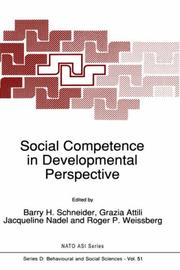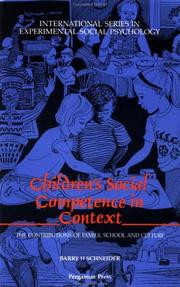| Listing 1 - 8 of 8 |
Sort by
|

ISBN: 0340732091 Year: 2000 Publisher: London : Arnold,
Abstract | Keywords | Export | Availability | Bookmark
 Loading...
Loading...Choose an application
- Reference Manager
- EndNote
- RefWorks (Direct export to RefWorks)
Peer pressure in children --- Peer pressure in adolescence --- Interpersonal relations in adolescence --- Interpersonal relations in children --- Interpersonal relations in adolescence. --- Interpersonal relations in children. --- Peer pressure in adolescence. --- Peer pressure in children. --- Ontwikkelingspsychologie --- sociale en morele ontwikkeling --- sociale en morele ontwikkeling. --- Sociale en morele ontwikkeling. --- Amitié --- Comportement social --- Enfant --- Identité collective --- Interaction sociale --- Relation interpersonnelle
Book
ISBN: 0387965343 1461387337 1461387310 Year: 1987 Publisher: New York (N.Y.): Springer
Abstract | Keywords | Export | Availability | Bookmark
 Loading...
Loading...Choose an application
- Reference Manager
- EndNote
- RefWorks (Direct export to RefWorks)
Age groups --- -Gifted children --- -Interpersonal relations --- Human relations --- Interpersonal relationships --- Personal relations --- Relations, Interpersonal --- Relationships, Interpersonal --- Social behavior --- Social psychology --- Object relations (Psychoanalysis) --- Bright children --- Child prodigies --- Children, Gifted --- Highly capable children (Gifted children) --- Mentally advanced children --- Prodigies, Child --- Superior children --- Talented children --- Exceptional children --- Gifted persons --- Groups, Age --- Peer groups --- Social generations --- Social groups --- Cohort analysis --- Gifted children --- Interpersonal relations. --- Experimentele psychologie --- leren en intelligentie --- leren en intelligentie. --- Interpersonal relations

ISBN: 0792304004 Year: 1989 Publisher: Dordrecht : Kluwer academic,
Abstract | Keywords | Export | Availability | Bookmark
 Loading...
Loading...Choose an application
- Reference Manager
- EndNote
- RefWorks (Direct export to RefWorks)
Ontwikkelingspsychologie --- Social skills in children. --- Socialization. --- Sociale en morele ontwikkeling.

ISBN: 0080377637 Year: 1993 Publisher: Oxford, England ; New York : Pergamon Press,
Abstract | Keywords | Export | Availability | Bookmark
 Loading...
Loading...Choose an application
- Reference Manager
- EndNote
- RefWorks (Direct export to RefWorks)
Book
ISBN: 2760519899 9782760519893 2760515621 9782760515628 9782760515628 Year: 2009 Publisher: Quebec : Presses de l'Universite du Quebec,
Abstract | Keywords | Export | Availability | Bookmark
 Loading...
Loading...Choose an application
- Reference Manager
- EndNote
- RefWorks (Direct export to RefWorks)
Écrit dans un langage accessible, cet ouvrage collectif propose une importante recension de la littérature s’intéressant aux comportements agressifs des enfants, comportements qui semblent attirer de plus en plus l’attention des médias et soulever d’importantes inquiétudes au sein du public. Des chercheurs, théoriciens et cliniciens reconnus dans le domaine de l’agressivité au Canada, en France, en Belgique et aux États-Unis, présentent diverses propositions théoriques actuellement soutenues par la recherche empirique et discutent des perspectives d’avenir de la recherche et de ses applications. Les chapitres concernent, entre autres, les différentes formes et fonctions de l’agressivité, les mesures de l’agressivité, l’agressivité indirecte, l’intimidation scolaire, les difficultés langagières, les facteurs de risque familiaux, le rejet par les pairs, les amitiés, les origines culturelles, les manifestations dans le sport et l’influence des médias sur les conduites agressives. Cette recension a pour but de répondre aux besoins des étudiants universitaires en sciences sociales et en sciences de la santé cherchant à mieux comprendre l’état actuel des connaissances scientifiques dans ce domaine qui porte à la controverse.
Aggressiveness in children. --- Problem children --- Child development. --- Aggressiveness in children --- Psychology. --- Prevention. --- Aggressiveness (Child psychology) --- Aggressiveness (Psychology) in children --- Child study --- Children --- Development, Child --- Difficult children --- Maladjusted children --- Development --- Child psychology --- Conduct disorders in children --- Developmental biology --- Developmental psychobiology --- Child rearing --- Behavior disorders in children --- Agressivité chez l'enfant --- Enfants --- Enfants difficiles --- Agressivité chez l'enfant. --- Prévention. --- Développement. --- Psychologie.
Periodical
Year: 1989 Publisher: Dordrecht Boston Lancaster Nijhoff
Abstract | Keywords | Export | Availability | Bookmark
 Loading...
Loading...Choose an application
- Reference Manager
- EndNote
- RefWorks (Direct export to RefWorks)

ISBN: 9780511499739 9780521842075 0511499736 9780511169052 0511169051 9780511168628 0511168624 9780511167621 0511167628 9781280436857 1280436859 9786610436859 6610436851 0521842077 0521842077 1107151619 0511312423 0511168179 9781107151611 9780511312427 9780511168178 Year: 2006 Publisher: Cambridge New York Cambridge University Press
Abstract | Keywords | Export | Availability | Bookmark
 Loading...
Loading...Choose an application
- Reference Manager
- EndNote
- RefWorks (Direct export to RefWorks)
This book responds to the absence of a comprehensive consideration of the implications of culture for children's peer relationships. Although research in this field has burgeoned in recent years, cultural issues have often been overlooked. The chapters tap such issues as the impact of social circumstances and cultural values on peer relationships, culturally prescribed socialization patterns and processes, emotional experience and regulation in peer interactions, children's social behaviors in peer interactions, cultural aspects of friendships, and peer influences on social and school adjustment in cultural context. The authors incorporate into their discussions findings from research programs using multiple methodologies, including both qualitative (e.g., interviewing, ethnographic and observational) and quantitative (e.g., large scale surveys, standardized questionnaires) approaches, based on a wide range of ages of children in cultures from East to West and from South to North (Asia, South America, the Mid-East, Southern Europe, and ethnic groups in the US).
Interpersonal relations in children. --- Social interaction in children. --- Culture --- Child psychology --- Psychological aspects. --- Health Sciences --- Psychiatry & Psychology
Book
ISBN: 0387961631 3540961631 1468463276 146846325X Year: 1985 Publisher: New York Berlin Tokyo Springer
Abstract | Keywords | Export | Availability | Bookmark
 Loading...
Loading...Choose an application
- Reference Manager
- EndNote
- RefWorks (Direct export to RefWorks)
| Listing 1 - 8 of 8 |
Sort by
|

 Search
Search Feedback
Feedback About UniCat
About UniCat  Help
Help News
News